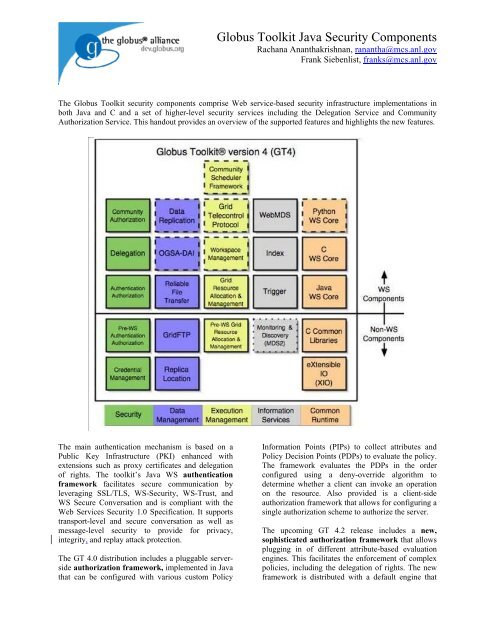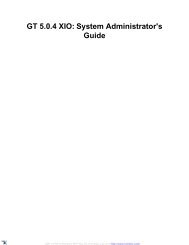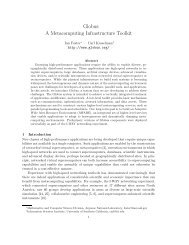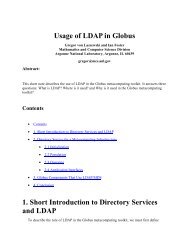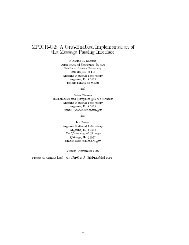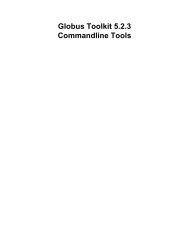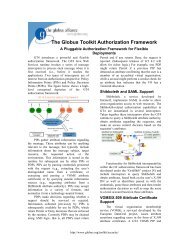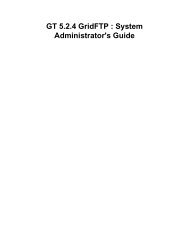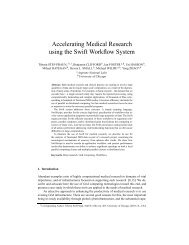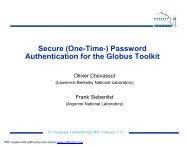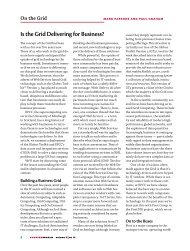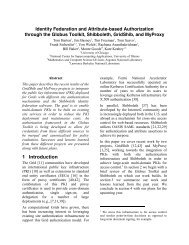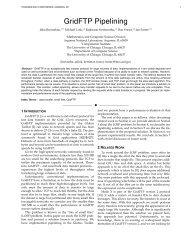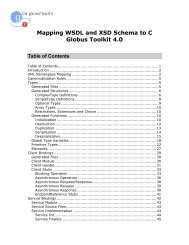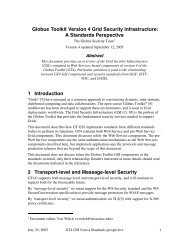The Globus Toolkit security components comprise ... - Globus Project
The Globus Toolkit security components comprise ... - Globus Project
The Globus Toolkit security components comprise ... - Globus Project
Create successful ePaper yourself
Turn your PDF publications into a flip-book with our unique Google optimized e-Paper software.
<strong>Globus</strong> <strong>Toolkit</strong> Java Security Components<br />
Rachana Ananthakrishnan, ranantha@mcs.anl.gov<br />
Frank Siebenlist, franks@mcs.anl.gov<br />
<strong>The</strong> <strong>Globus</strong> <strong>Toolkit</strong> <strong>security</strong> <strong>components</strong> <strong>comprise</strong> Web service-based <strong>security</strong> infrastructure implementations in<br />
both Java and C and a set of higher-level <strong>security</strong> services including the Delegation Service and Community<br />
Authorization Service. This handout provides an overview of the supported features and highlights the new features.<br />
<strong>The</strong> main authentication mechanism is based on a<br />
Public Key Infrastructure (PKI) enhanced with<br />
extensions such as proxy certificates and delegation<br />
of rights. <strong>The</strong> toolkit’s Java WS authentication<br />
framework facilitates secure communication by<br />
leveraging SSL/TLS, WS-Security, WS-Trust, and<br />
WS Secure Conversation and is compliant with the<br />
Web Services Security 1.0 Specification. It supports<br />
transport-level and secure conversation as well as<br />
message-level <strong>security</strong> to provide for privacy,<br />
integrity, and replay attack protection.<br />
<strong>The</strong> GT 4.0 distribution includes a pluggable serverside<br />
authorization framework, implemented in Java<br />
that can be configured with various custom Policy<br />
Information Points (PIPs) to collect attributes and<br />
Policy Decision Points (PDPs) to evaluate the policy.<br />
<strong>The</strong> framework evaluates the PDPs in the order<br />
configured using a deny-override algorithm to<br />
determine whether a client can invoke an operation<br />
on the resource. Also provided is a client-side<br />
authorization framework that allows for configuring a<br />
single authorization scheme to authorize the server.<br />
<strong>The</strong> upcoming GT 4.2 release includes a new,<br />
sophisticated authorization framework that allows<br />
plugging in of different attribute-based evaluation<br />
engines. This facilitates the enforcement of complex<br />
policies, including the delegation of rights. <strong>The</strong> new<br />
framework is distributed with a default engine that
<strong>Globus</strong> <strong>Toolkit</strong> Java Security Components<br />
Rachana Ananthakrishnan, ranantha@mcs.anl.gov<br />
Frank Siebenlist, franks@mcs.anl.gov<br />
attempts to construct a delegation chain from the<br />
resource owner to the access requestor to establish<br />
whether access can be granted. Further, the engine<br />
differentiates between access rights, which allow an<br />
entity to access a resource and administration rights,<br />
which allow an entity to delegate its access rights to<br />
another.<br />
<strong>The</strong> Java WS Security framework provides both<br />
declarative and programmatic <strong>security</strong>. That is,<br />
<strong>security</strong> properties can be configured just as<br />
configuration files, called <strong>security</strong> descriptors,<br />
without modifying any code. Alternatively, the<br />
properties can be incorporated as part of the source<br />
code.<br />
On the server side, <strong>security</strong> properties can be<br />
configured as resource-, service-, and container-level<br />
granularity; the properties are picked up in that order<br />
of precedence. Typical server side <strong>security</strong> properties<br />
include the credentials to use, the authentication<br />
mechanism required to be used by the client, the<br />
authorization mechanism to use to authorize client<br />
access, and the credential to associate with the<br />
current thread. Similar declarative or programmatic<br />
<strong>security</strong> can be used on client side to configure<br />
properties such as credentials to use, the<br />
authentication scheme to use, and the authorization<br />
scheme to use to authorize the server.<br />
<strong>The</strong> Delegation Service allows for the delegation of<br />
user rights to a remote resource independent of the<br />
communication protocol. Its implementation<br />
conforms to the WS-Trust specification. <strong>The</strong> service<br />
is based on the Web Services Resource Framework<br />
(WSRF) specification, with each delegated credential<br />
being a resource, and allows delegation of credentials<br />
to a hosting environment. Delegated credentials can<br />
be shared across multiple invocations and multiple<br />
services in a hosting environment. Also, the service<br />
retains the delegated credentials on disk and enables<br />
the user who delegated the credential to refresh the<br />
credential.<br />
<strong>The</strong> Community Authorization Service allows for<br />
fine-grained authorization policy management for<br />
distributed resources. <strong>The</strong> authorization request<br />
protocol is based on the Simple Assertion Markup<br />
Language (SAML) specification, and the service is<br />
constructed as a WSRF-based service, while the<br />
actual policy is stored in a backend database. CAS<br />
supports both a pull model, where the resource can<br />
pull down the policy decisions from the server, and a<br />
push model, where the client can contact server to get<br />
the assertions from the CAS server and send it to the<br />
resource. <strong>The</strong> CAS service implements the GGF<br />
OGSA-AuthZ Authorization Service (using SAML<br />
OGSA Authorization, Global Grid ForumGFD.066;<br />
http://www.ggf.org/documents/GFD.66.pdf)<br />
specification to provide the pull interface. This<br />
specification allows the CAS service to be queried<br />
for specific policy decisions for resource access.<br />
<strong>The</strong> toolkit provides callouts to use the CAS service<br />
for authorization of file access using the GridFTP<br />
component and authorization of any resource in the<br />
Java WS Core framework. <strong>The</strong> GridFTP<br />
authorization using CAS uses the push model,<br />
where the client pushes assertion from the CAS<br />
server in its request to the GridFTP server. <strong>The</strong><br />
assertion can be embedded in the proxy certificate<br />
used by the client and also can be cached across<br />
multiple sessions. <strong>The</strong> server processes the assertion<br />
to evaluate and determine access to file.<br />
In the 4.2 version of the <strong>Globus</strong> <strong>Toolkit</strong>, the Java WS<br />
authorization framework provides for pluggable<br />
PDPs and PIPs that allow for using CAS for Web<br />
service policy management. In order to support pull<br />
model, a PIP is provided that extracts the assertions<br />
from a client’s proxy or the message header. A PDP<br />
then evaluates the extracted assertion, and the<br />
authorization decision processes it to provide a<br />
decision. In order to support the push model, a<br />
generic authorization callout is provided that talks to<br />
any OGSA AuthZ-compliant authorization service.<br />
<strong>The</strong> callout can be used to talk to a configured CAS<br />
service to pull down assertions about a particular<br />
resource access.<br />
<strong>The</strong> Portal-based User Registration Service<br />
provides a set of tools for automating user<br />
registration and credential management, especially<br />
for portal-based systems. It provides a set of<br />
customizable <strong>components</strong> that can be used to manage<br />
the full lifecycle of Grid-based credential<br />
management. <strong>The</strong> tools provide a backend API to<br />
register a new user, issue credentials for the user,<br />
manage registered users, renew credentials for users,<br />
and so on. <strong>The</strong> tools interface with a backend<br />
database that stores the user details.<br />
<strong>The</strong> <strong>Globus</strong> <strong>Toolkit</strong> is an open source project, and<br />
community participation is encouraged and<br />
welcomed. For more information on the toolkit and<br />
ways to contribute, please see http://dev.globus.org/ .


